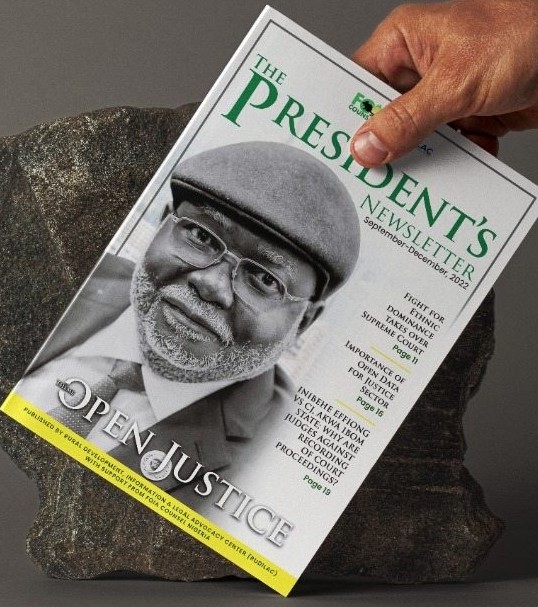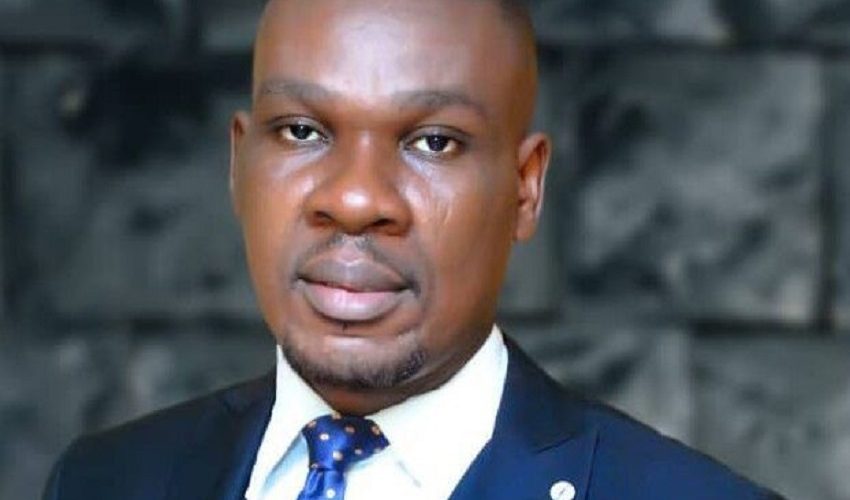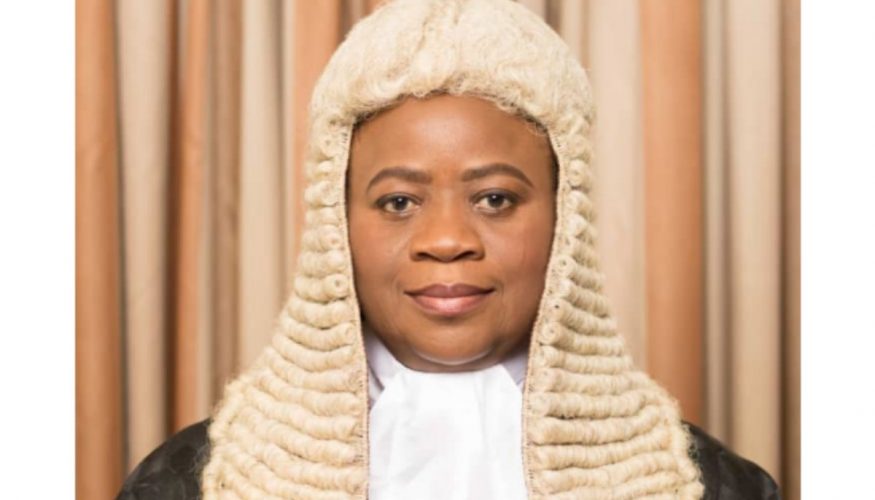BY JESSE NWAENYO
Environmental democracy involves a tripartite reinforcing right that, while independently important, operate best in combination: the ability for people to freely access information on environmental quality and problems, to participate meaningfully in decision-making, and to seek enforcement of environmental laws or compensation for damages . This article seeks to explain the concept of environmental democracy and the importance thereof in preserving the environment and its components.
INTRODUCTION
The protection of our environment started in pre-colonial era when Africans protected their environment through observation of culture, norms and customs. The second phase was the period of the imperialist, when common law and English statutes were introduced to curb or prevent pollution of our environment. The emergence of the third era was marked by the toxic waste dumped in koko, a riverine town in Delta State (formerly Bendel State) in 1988, Nigeria for the first time got hints of the Harmful Toxic Waste Cargo from some Nigerian students studying in Italy through letters they sent to some media houses alerting them that the lethal cages carrying wastes rejected in Europe were being consigned to Nigeria under false inscriptions. The rest of this incident is now history, but it opened the eyes of Nigerians and the government on the need to put environmental law enforcement in proper shape. This third era marked Nigeria’s seriousness towards protecting her surroundings.
Environmental democracy is about government being transparent, accountable, and involving people in decisions that affect their environment.
Participation is central to the notion of environmental democracy. Public participation is necessary for the existence of a democratic society. It serves an educative function by teaching citizens to understand the difference between individual desire and common interest and equipping them with the knowledge and confidence needed to engage in participatory activities. In this sense, participation cultivates the very qualities necessary for it; the more individuals participate the better able they become to do so.
Worthy to note that humans are part of the society as well as other living creatures, which include plants and animals, this belief, is held by proponents of environmental ethics. Environmental ethics is a branch of ethics that studies the relation of human beings and the environment and how ethics play a role in this . In this regard, the bio-centric environmental philosophers consider all living things to have the same worth.
WHAT IS AN ENVIRONMENT
Environment can be defined from a lay man perspective and equally from a broader view. The concept is very technical in scope and application. Bearing this in mind, it is not easy to arrive at a universal and generally accepted definition of the concept. Various scholars have made attempt to define the concept in different ways.
The word Environment is derived from the French word ‘Environner’ which means to ‘encircle or surround’. The first recorded usage of the word was by Thomas Carlyle in 1827 and in 1956.
Generally, it is defined as our surroundings especially material and spiritual influences which affect the growth, development and existence of living being. The United Nation Stockholm Conference on Human Development asserts ‘man is both creature and moulders’ of his environment, which gives him physical sustenance and affords him the opportunity for intellectual, moral, social and spiritual growth.
The National Environmental Standard and Regulation Enforcement Act defines ‘environment’ in the following perspectives; ‘Environment’ include water, air, land, animals living therein and in relationship exist among these or any of them .
The Constitution of the Federal Republic of Nigeria (1999) defines environment as:
(a) The water
(b) Forest and wildlife
(c) All layers of the atmosphere
(d) All organic and in-organic matter and living organisms, and
(e) The interacting nature system that includes the component referred to in paragraph (a) – (d).
Environmental law therefore covers the whole universe including not only human beings but also plants, animals, forest shrubs, refuse, bacteria and insects.
WHAT IS DEMOCRACY
Democracy is derived from the Greek word demokratia, meaning “rule by the people.” It’s made up of two roots demos, meaning “the people,” and kratos, meaning ‘power.”
One belief that is foundational to democracy is the term isonomia, meaning “equality before the law.”
The term democracy in the practical sense implies a social partnership between the people and the government; the right of expression and recognition of the views of the people before the implementation of any government policy. In essence, the voice of the people is supreme in a democratic setting; consequently, the welfare of the people should be the supreme law: salus populi suprema lex esto.
ENVIRONMENTAL DEMOCRACY
Environmental democracy is the participation of citizens in planning processes with environmental effects and aims at mutual commitment by citizens and public authorities to change their behaviors in order to improve sustainable development.
At its core, environmental democracy involves three mutually reinforcing rights that, while independently important, operate best in combination: the ability for people to freely access information on environmental quality and problems, to participate meaningfully in decision-making, and to seek enforcement of environmental laws or compensation for damages.
Far too often, the public is not meaningfully engaged in decisions that could affect their health, livelihoods, and culture. These three key components – access to information, participation and justice – also known as “access rights” are reflected in Principle 10 of the Rio Declaration on Environment and Development. They are at the heart of environmental democracy, embodying the procedural dimensions of the right to a healthy environment.
WHAT DOES ENVIRONMENTAL DEMOCRACY LOOK LIKE?
Several years ago, developers proposed a five-dam project on the Baker and Pascua Rivers in Patagonia, Chile. While they projected that the hydropower would produce 2,750 megawatts of power, the project would also flood 23 square miles of wilderness, jeopardizing the environment, local culture, and tourism of the region.
Citizens opposed the project, arguing that Chile’s energy needs could be met through less damaging projects, such as energy efficiency and renewable energy. Sometime in June 2014—after eight years of campaigning by the Patagonia Defense Council, a coalition of more than 70 domestic and international organizations and individuals—Chile’s Environment Minister, Pablo Badenier, revoked the permit. The advocacy of this coalition, which includes Access Initiative member FIMA, was credited by International Rivers as “perhaps the most important reason” for the reversal.
The success of this campaign is a powerful example of the importance of public participation in land-use decisions. Civil society raised concern over the impacts of the proposed dams on livelihoods and the environment, which ultimately created political opposition. However, far too often the public is not meaningfully engaged in these decisions. This is often due to weak laws that limit the public’s access to information, do not provide adequate public voice in decision-making, or provide no access to justice when environmental harms are committed. These issues are at the heart of environmental democracy—a key component in preserving the health of communities and the regions they call home.
WHY IS ENVIRONMENTAL DEMOCRACY IMPORTANT?
Environmental democracy is rooted in the idea that meaningful participation by the public is critical to ensuring that land and natural resource decisions adequately and equitably address citizens’ interests. Rather than setting a standard for what determines a good outcome, environmental democracy sets a standard for how decisions should be made.
UNDERSTANDING THE THREE FUNDAMENTAL RIGHTS: INFORMATION, PARTICIPATION AND JUSTICE
ACCESS TO INFORMATION
When well-designed and implemented, access-to-information laws require that governments and companies make information such as environmental impact assessments, development project plans, and pollution discharges freely available to the public. By being informed, the public can participate more effectively in decision-making and hold companies and governments accountable for actions that are not in accordance with the law. Information should not only be available, but accessible to the public through formats they can readily use—taking into account literacy, language, readability, use of technology, and more.
Making environmental information open and freely accessible can often be the foundation for change. The United States, for example, developed the first ever Pollutant Release Inventory (PRTR), called the Toxics Release Inventory, in 1986 following several environmental disasters including a chemical release from the Union Carbine plant in West Virginia in 1985. The TRI requires that certain industrial facilities annually submit data on the quantity of toxic chemicals they release. Since 1986, at least 50 countries have developed PRTRs or implemented pilot programs. While the US TRI certainly still has room for improvement, compelling companies to make this data public has helped reduced the incidence of toxic releases in the country.
PUBLIC PARTICIPATION
Public participation laws improve information flow between communities and government or private sector decision-makers. This exchange can help avoid unintended consequences, increase support for a decision, and lead to a more equitable distribution of costs and benefits. The public should be informed early in the decision-making process about opportunities to participate, such as through town hall meetings or community workshops. They also need to be provided with any information necessary to meaningfully engage—such as environmental impact assessments—and should be able to participate without incurring burdensome costs, such as traveling to a capital city. Participation is less meaningful when the public is merely informed of an upcoming decision and left with no opportunity to influence it.
One of the better-known public participation processes for the environment is through Environmental Impact Assessments (EIA), which in many countries require public consultations before the development of projects that will have environmental impacts. However, these consultations can vary widely in quality. When the public is given ample notice along with the necessary information to understand and participate meaningfully, these assessments can be effective ways to safeguard against environmental harms or to ensure that adequate compensation. On the other hand, public consultations that serve only to inform of a decision that has already been made undermine public trust, reduce legitimacy and stifle the flow of important information.
ACCESS TO JUSTICE
When members of the public do lack access to information and participation, they should be able to exercise a right to seek justice—such as compensation or appealing a project. These accountability mechanisms should be independent and impartial, and ideally able to issue binding, enforceable decisions.
Environmental tribunals such as India’s National Green Tribunal (NGT) are good examples of mechanisms that provide access to justice. The NGT was established in 2010 in recognition of the large number of court cases involving environmental disputes. The tribunal has jurisdiction over all civil cases involving “substantial question[s] relating to [the] environment,” and is mandated to attempt to conclude a case within six months of the filing date. Between May 2011 and March 2014, the Tribunal has adjudicated 393 cases.
LOCUS STANDI IN ENVIRONMENTAL CASES IN NIGERIA
The concept of locus standi is a development of case law. Essentially, it has been held to mean “standing to sue.” It is the legal capacity to institute or commence an action in a competent court of law or tribunal without let or hindrance from any person or body whatsoever. The applicant must show sufficient interest in the subject matter of the suit, which interest would be affected by the action or the damage or injury he would suffer as a result of the action.
In the case Adesanya v. President of the Federal Republic of Nigeria it was held per Fatayi-Williams, CJN that:
“…the law is now well settled that the plaintiff will have locus standi in the matter only if he has a special legal right or alternatively, if he has a special interest in the performance of the duty sought to be enforced, or where his interest is adversely affected. What constitutes a legal right, sufficient or special interest, or interest adversely affected, will of course, depend on the facts of each case.”
In the past, the Court adopted a restrictive approach to the issue of locus standi. However, in recent times, the attitude of the Court to locus standi in respect of Environmental matters has changed from a restrictive and technical approach to a liberal view.
In the case of the Registered Trustees of the Socio-economic Rights & Accountability Project Law Report (SERAPLR) & 10 Ors. v. The Federal Republic of Nigeria, the Community Court of Justice (Abuja Division) in deciding whether non-governmental organizations can file complaint on human rights issues on behalf of vulnerable individuals and impoverished communities held that:
“With the same purpose to ease access to Justice on Human Rights issues by most vulnerable individuals and by impoverished communities, which most of the time, do not have means to lodge a complaint by themselves, in particular when the opposite party is a very powerful entity, the ECOWAS Court of justice has reiterated in many instances that, in case of serious human rights violation, a Non-Governmental Organization may enjoy standing to file a complaint on their behalf or to join them in the same complaint, even if the applicant has not been directly affected by the violations it is complaining of.” Per Ramos, J. [P.98] lines 15-30.
In the salutary case of Center for Oil Pollution Watch v. Nigerian National Petroleum Corporation , the Supreme Court robustly held, inter alia, that:
‘The time has come for the Supreme Court to relax the application of the rule of locus standi in cases founded on public interest litigation especially in environmental issues. No particular persons own the environment. It is the duty of all and where government agencies desecrate such environments and other relevant government agencies failed, refuse and/or neglect to take necessary steps to enforce compliance, non-governmental organizations, which do not necessarily seek their personal interest, can bring an action in court to demand compliance and ensure the restoration, remediation and protection of the environment. It is in the interest of the public including the government in general.”
The Supreme Court brilliantly noted that it would be a grave lacuna in the system of public law if a pressure group or even a single public-spirited tax-payer were prevented by outdated technical rules of locus standi from bringing a matter to the attention of the Court to vindicate the rule of law and get an unlawful conduct stopped. The Supreme Court believe that this liberal approach will further promote public interest litigation which is an action usually brought for the benefit of a group or class of persons who have suffered a general wrong or about to so suffer as a result of the activities of other persons or corporate institutions . Suffice it to say that this judgment recognized one of the elementary features of public interest litigation which is that the victims are often groups or persons who would not ordinarily be in a position to approach the Court on their own due to impecuniosity or lack of awareness of their rights.
CONCLUSION
Environmental democracy is about government being transparent, accountable, and involving people in decisions that affect their environment.
The new term ‘environmental democracy’, now taking hold, reflects increasing recognition that environmental issues must be addressed by all those affected by their outcome, not just by governments and industrial sectors. It captures the principle of equal rights for all those in the environment debate – including the public, community groups, advocates, industrial leaders, workers, governments, academics and health care professionals. For those whose daily lives reflect the quality of their environment, participation in environmental decision-making is as important as in education, health care, finance and government.
Participation is central to the notion of environmental democracy, which privileges collective decision-making among citizens above decisions based solely on administrative, professional, or scientific expertise.
Environmental democracy is also referred to as environmental justice. Environmental justice offers researchers new insights into the juncture of social inequality and public health and provides a framework for policy discussions on the impact of discrimination on the environmental health of diverse communities. The goal of environmental justice is to provide an environment where all people enjoy the same degree of protection from environmental and health hazards and equal access to the decision-making process to maintain a healthy environment in which to live, learn, and work.
RECOMMEDATION
It is recommended that special tribunals be set up in Nigeria to handle environmental infringements and that the government should be frank about implementation of policies that will protect the environment.
When these tribunals are set up, they should have special Rules and Procedures that, inter alia, ascribes a time frame for the hearing and determination of cases instituted in the Tribunal just like the Election Petition Tribunal.
It is also recommended that massive awareness and education on environmental issues and rights should be initiated from the grassroot. Some of the ways awareness can be created by relevant bodies in environmental campaigns is to engage social media platforms, setting up clubs/groups in secondary schools to discuss environmental issues, organizing seminars, workshops and conferences to discuss environmental issues in Nigeria, partnering with the traditional rulers to establish a program for environmental education, engaging in periodic public walk like “Green March” and so on.
To join our Telegram platform, please click here
COPYRIGHT 2022 CITY LAWYER. Please send emails to citylawyermag@gmail.com. Join us on Facebook at https://web.facebook.com/City-Lawyer-Magazine-434937936684320 and on TWITTER at https://twitter.com/CityLawyerMag. To ADVERTISE in CITY LAWYER, please email citylawyermag@gmail.com or call 08138380083. All materials available on this Website are protected by copyright, trade mark and other proprietary and intellectual property laws. You may not use any of our intellectual property rights without our express written consent or attribution to www.citylawyermag.com. However, you are permitted to print or save to your individual PC, tablet or storage extracts from this Website for your own personal non-commercial use.




